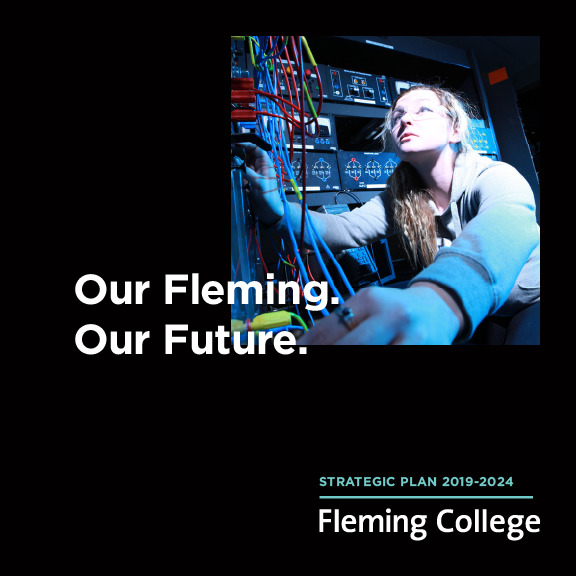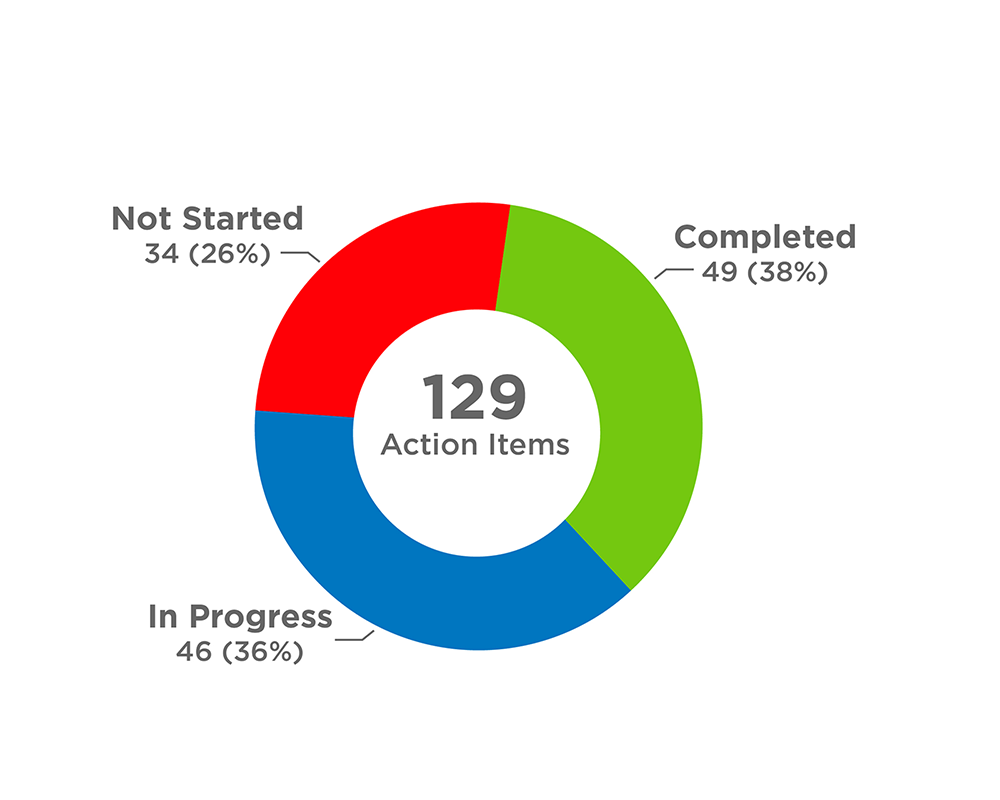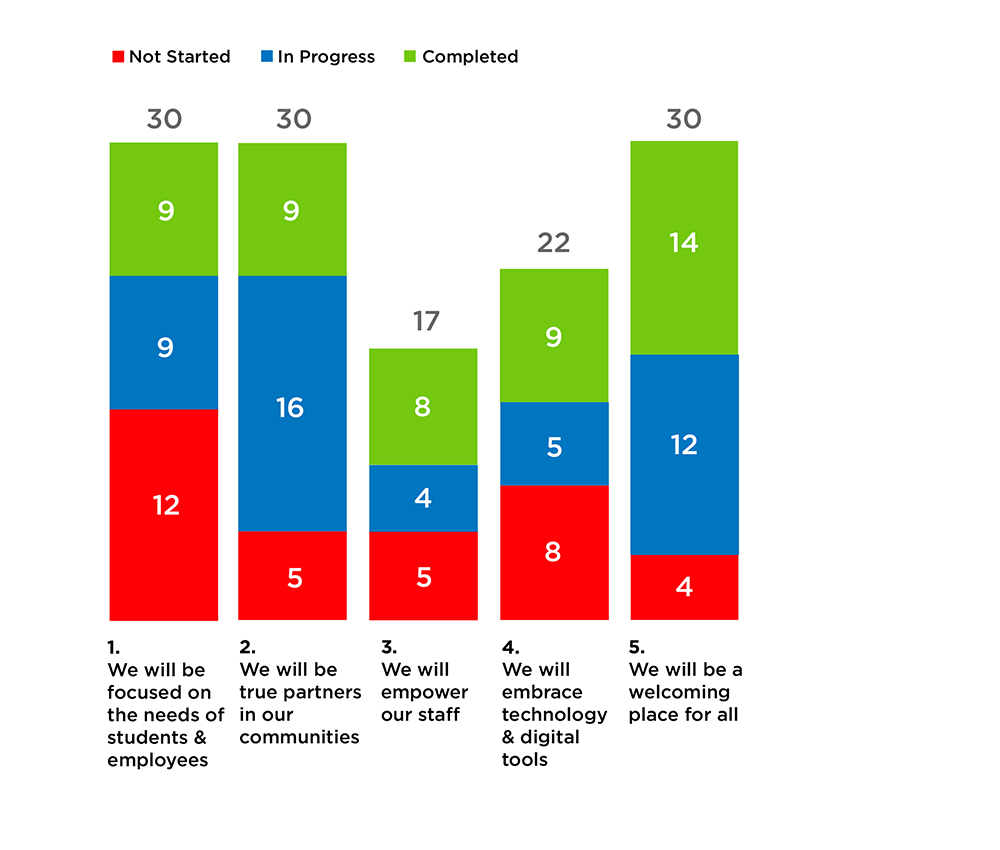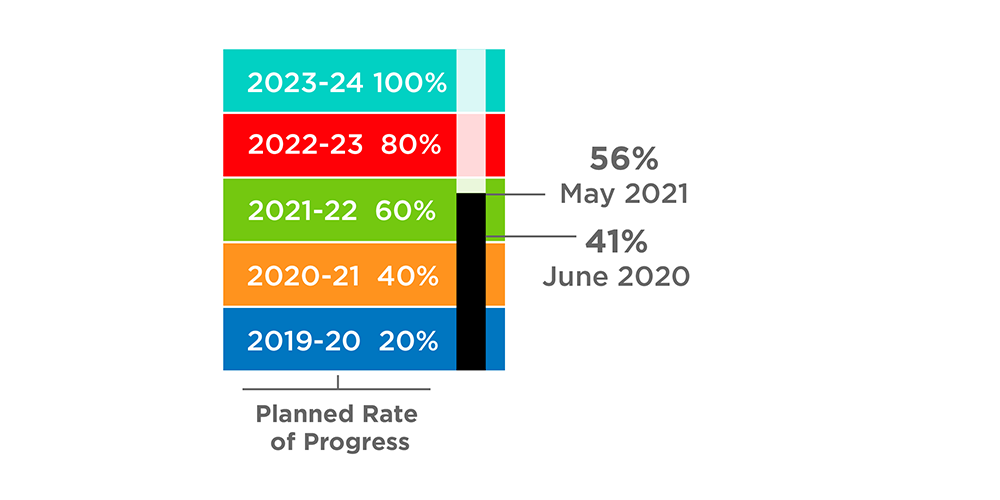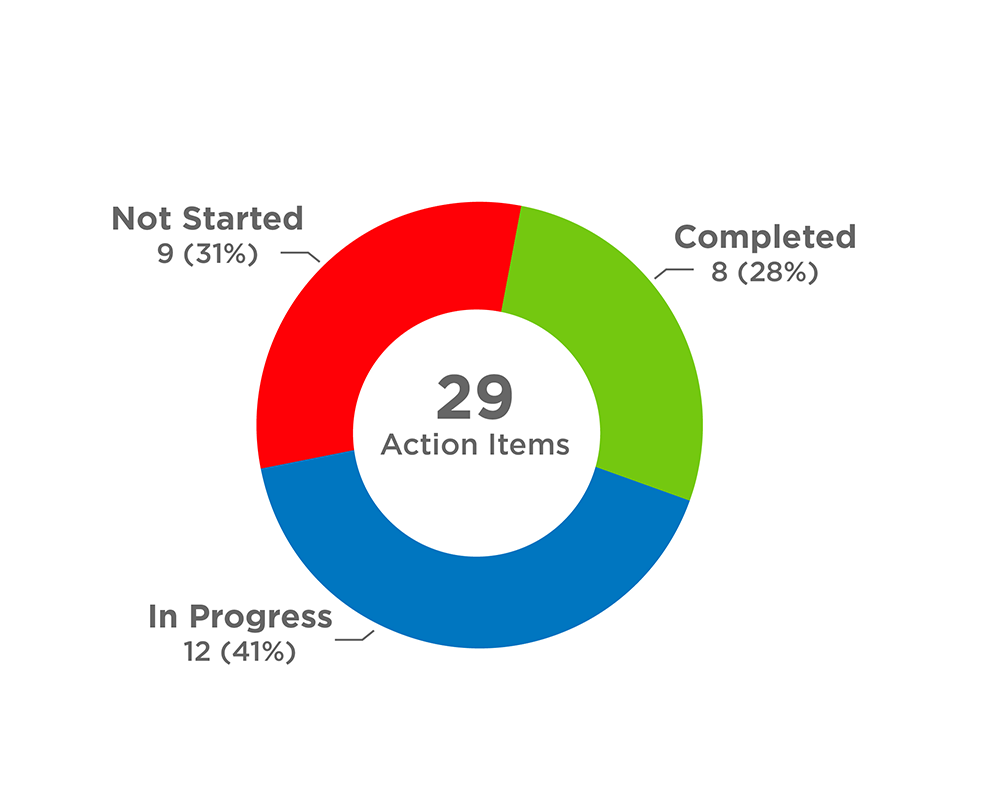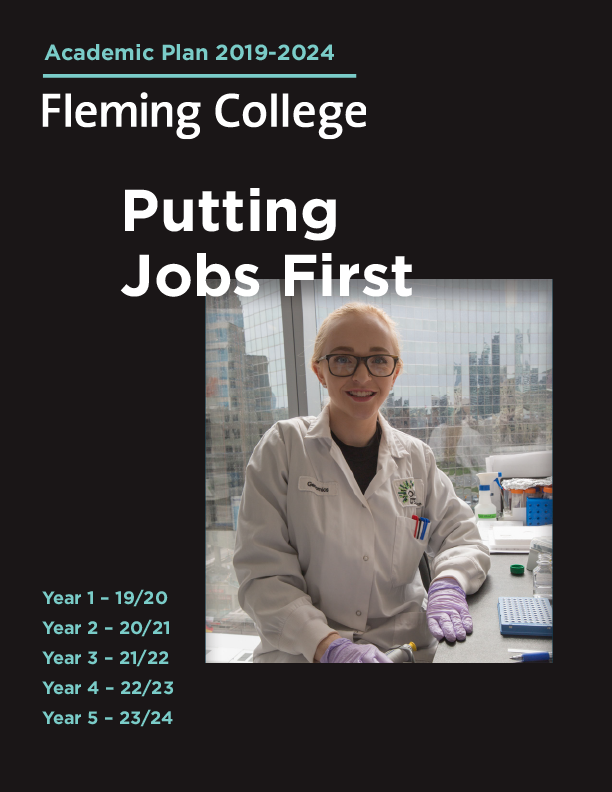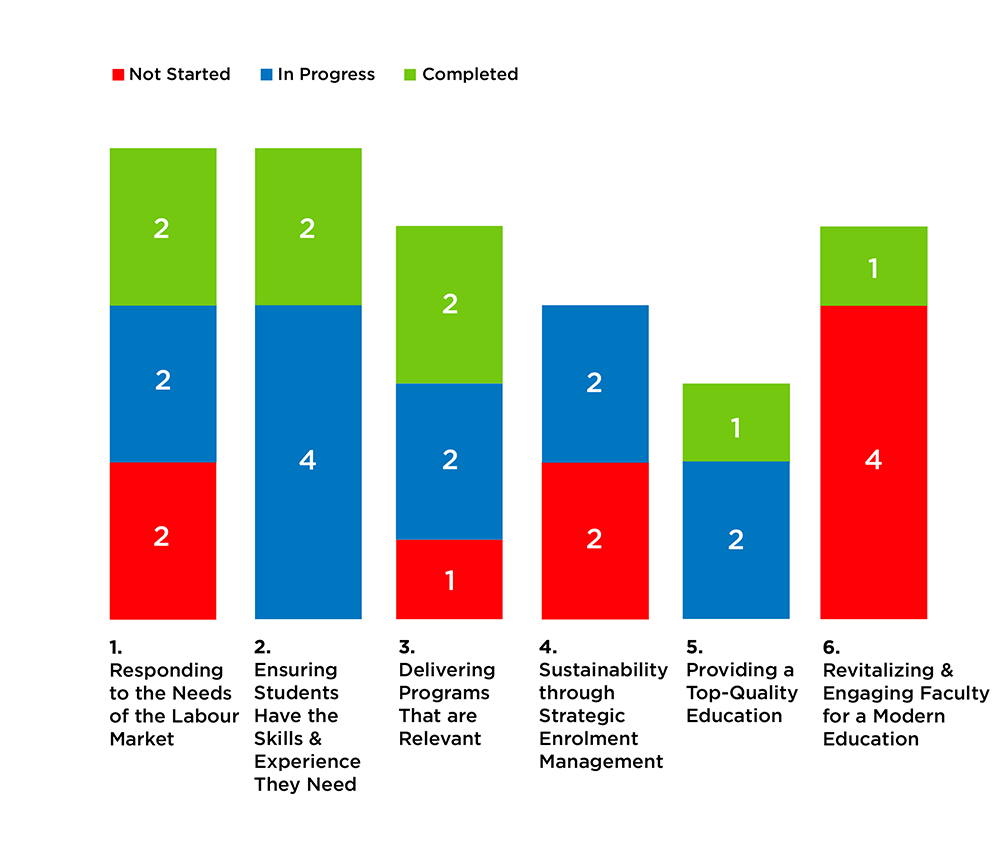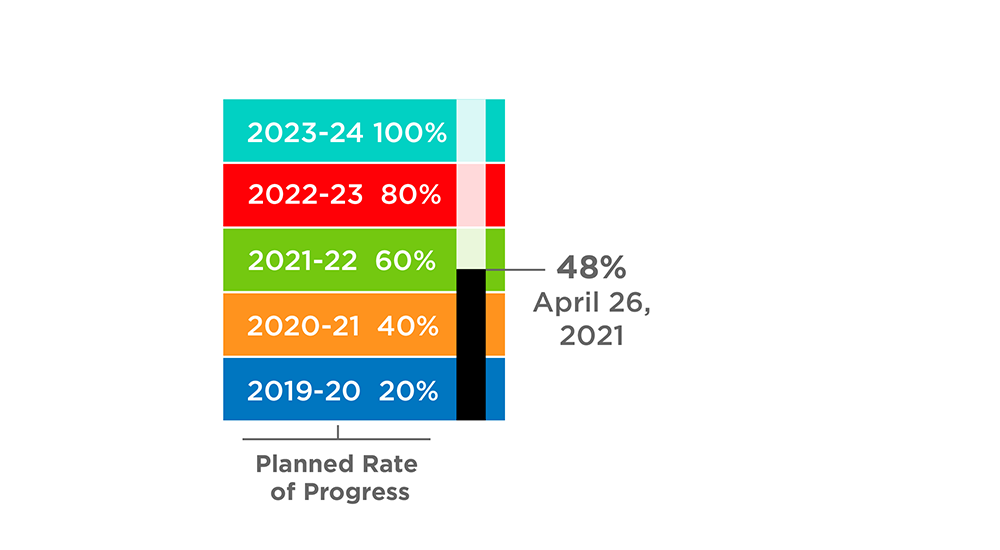MISSION
To empower our students with the innovative education, research and real-world experiences they need to build better lives, better communities and a better world.
VISION
Creating prosperity and transforming communities through education and innovation.
VALUES
We will achieve our vision and mission by adhering to our values:
- Responsiveness,
- Innovation,
- Collaboration,
- Inclusiveness, and
- Accountability

A Message from the Chair
On behalf of the Board of Governors of Sir Sandford Fleming College, it is my pleasure to present our 2020-2021 Annual Report. The Board is grateful to President Maureen Adamson, and the team of Fleming employees for their dedication and commitment to student success.
Fleming’s Board of Governors has continued to meet virtually to review the administrative response to COVID-19. We have witnessed the College deliver on the Strategic Plan and employ it as a roadmap in every decision along the way. I am pleased to report that we have exceeded many milestones, irrespective of the challenges that we have navigated through in 2020-2021.
Our Board has been engaged and supportive of the management team at the College and I want to extend my appreciation to the governors who have led the charge to date with a special thanks to those who will be completing their term this coming August.
On behalf of Fleming’s Board of Governors, I want to thank the Province of Ontario for its ongoing commitment to supporting postsecondary education and funding. Our local MPPs have been champions of Fleming College and always open to new ideas in postsecondary education.
Finally, it is my pleasure and honour to serve as Board Chair. As a Fleming graduate myself, this is a role that I humbly assume with great pride.
Fred Clifford, Chair
Board of Governors of
Sir Sandford Fleming College
A Message from the President
With the support of Board Chair Fred Clifford and the Board of Governors of Fleming College, I am pleased to submit this year’s Annual Report on the 2020-2021 progress made towards achieving our Strategic Plan.
This past year, we have continued to navigate through the challenges that COVID-19 presented, pivoting and adapting on a pin to keep our students, staff and community safe. Despite the challenges, we have made impressive progress towards achieving our goals set out in our Strategic Plan. As we look to our future with optimism, we must remain vigilant and refuse to let our guard down.
As I reflect on the progress we have made this past year, I am inspired by not only our accomplishments but our productive future. Our Strategic Plan has been our roadmap that guides and influences every decision we make as a College. We have embraced technology in new and innovative ways to ensure that our operations continue, and students experience as little interruption to their learning outcomes as possible.
Perhaps most important, Fleming has remained a welcoming place for all, on our campuses, in our virtual classrooms, and in the communities that we serve. We are a public asset and with that comes the responsibility to ensure that all members of our community feel welcome and safe.
We are working on a robust recovery plan that will allow us to transition back to ‘normal’ operations when it is safe to do so, guided by public health guidelines.
Finally, I would like to take a moment to acknowledge all the hard work and dedication of our Board, our faculty and staff, our communities, and our partners. Together, we continue to put students first.
Maureen Adamson,
President

2020-2021 Business Plan
Review
54 Objectives to achieve
20 Goals related to
5 Commitments in the
2nd Year of the Strategic
Plan Implementation
Overall Performance Evaluation
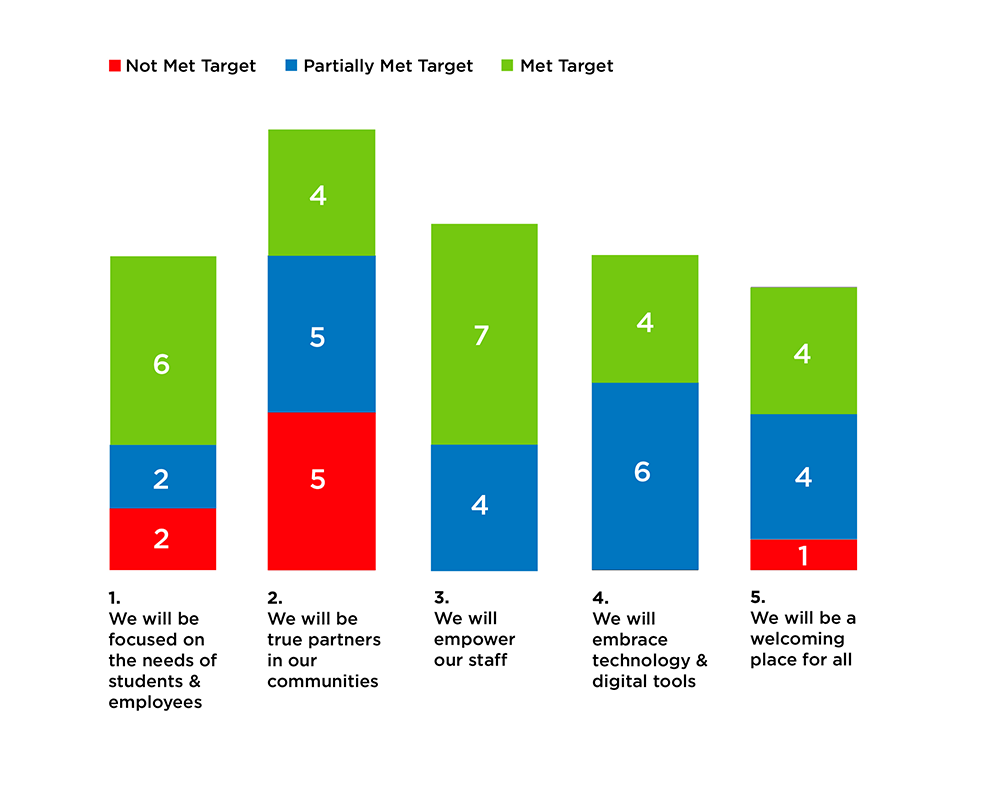
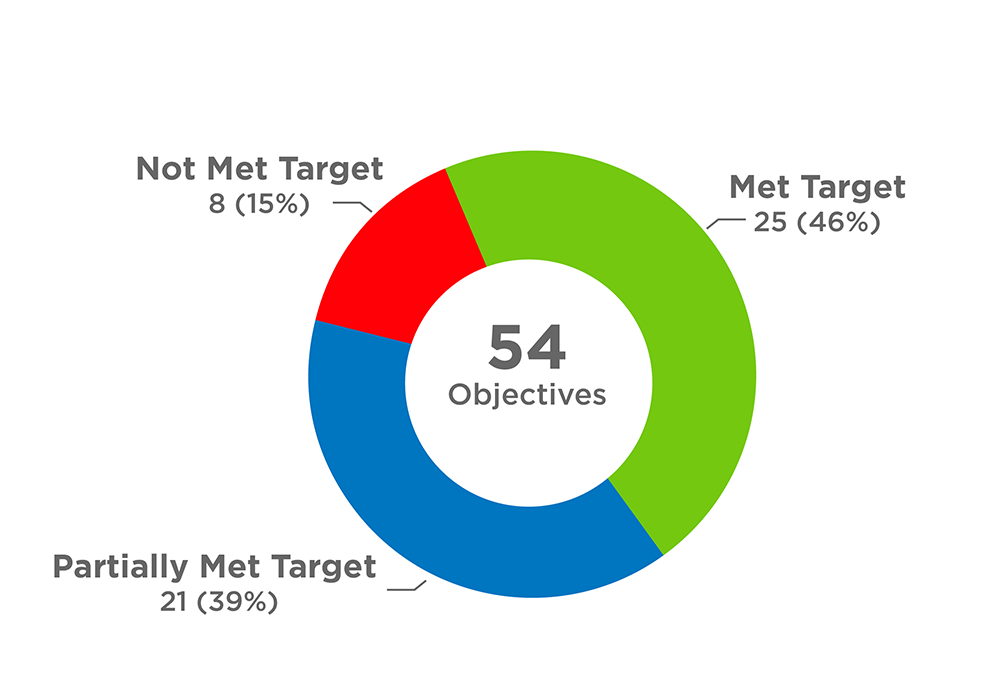
1. We will be focused on the needs of students and employers
in the labour market.
Objectives & Achievements
2. We will be true partners in our communities.
Objectives & Achievements
3.We will empower our staff.
Objectives & Achievements
4. We will embrace technology and digital tools.
Objectives & Achievements
5. We will be a welcoming place for all.
Objectives & Achievements
2020-2021
SMA3 Annual Evaluation Report
As with all public provincial colleges, Fleming College entered into a 2020-2025 Strategic Mandate Agreement (SMA3) with the Ontario Government. 2020-21 was the first year of the agreement and five of the ten metrics were activated using 2019-2020 data for evaluation. Fleming exceeded four out of the five metric targets.
The COVID-19 pandemic played a significant role in Fleming not achieving the Economic Impact metric.
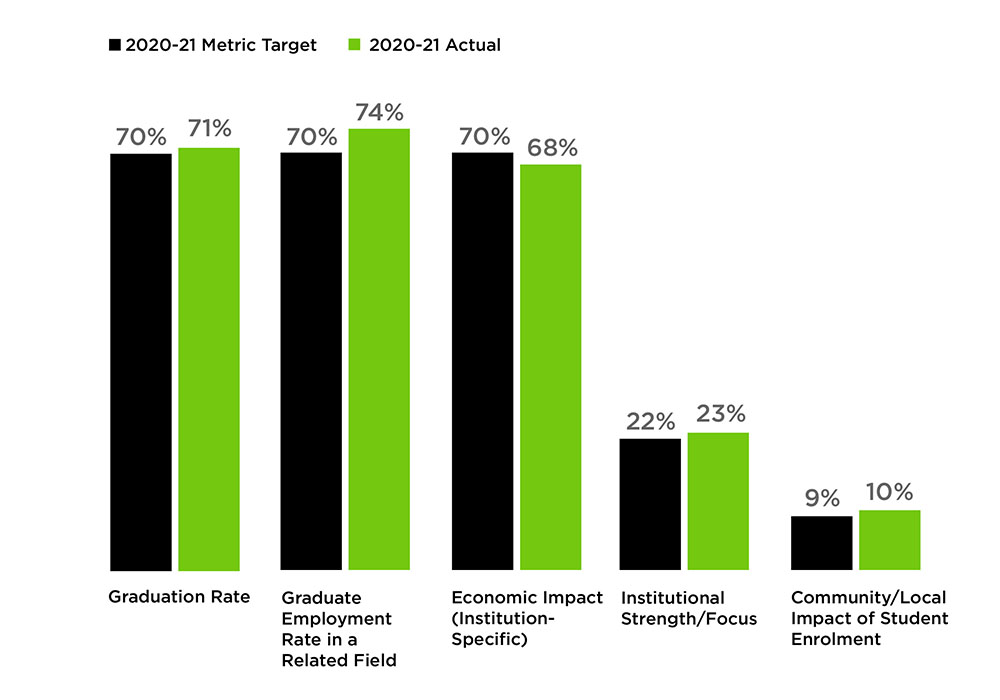
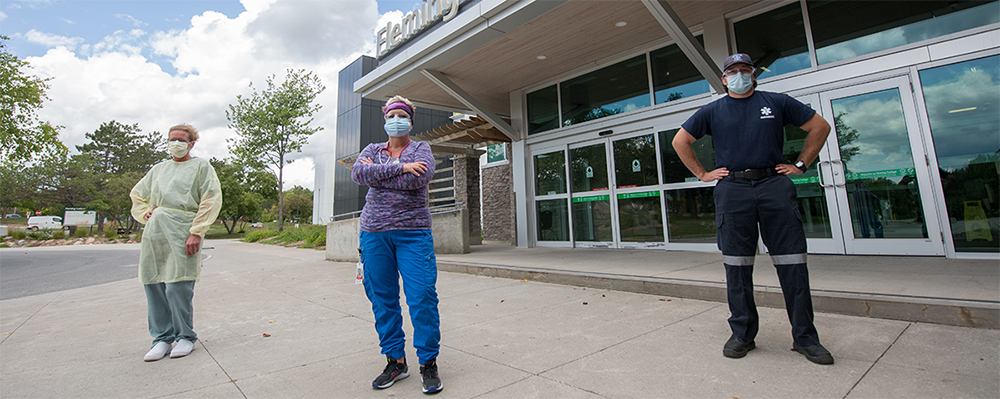
Risk Management Report
Q4 Highlights
34
Total Risks
18 Non COVID-Related Risks
16 COVID-Related Risks
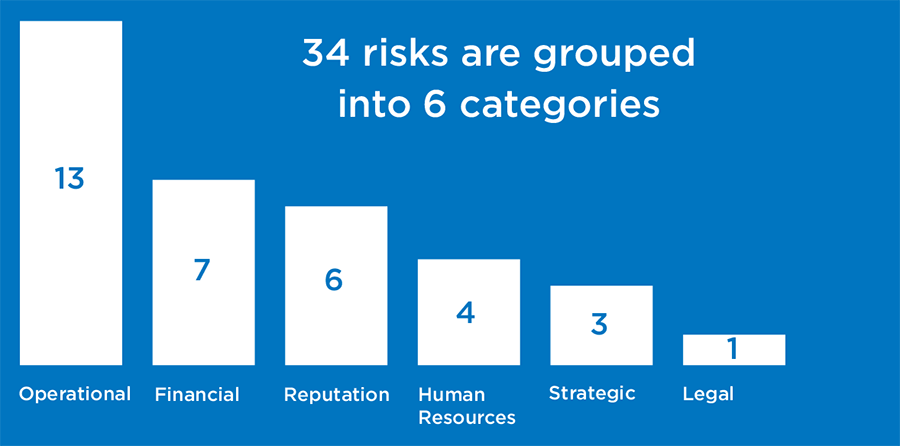

Using the risk matrix, identified risks are analyzed to determine the likelihood that the risk will occur and the impact it will have on the organization if it does occur. The risk analysis results in a risk score between 1 and 25.
Of the 34 risks in the Risk Register for the Q4 report, the average risk score was 11. The Board of Governors has adopted a risk appetite of 15. This appetite level, allows the college to pursue opportunities that will benefit the college while managing the risks associted with those opportunities.
Six risks exceeded the risk appetite in Q4/20-21 and were reviewed by the Board of Governors.
Focusing on Jobs and Workforce Development Initiatives
Fleming’s communities have experienced a profound disruption to employment during the COVID pandemic.
Fleming responded to this challenge and
- remained engaged in local workforce development activities,
- continued to deliver employment and training programming to its communities, and
- equipped itself with the key tools needed to better understand the changing nature of jobs and employment needed to strengthen the local workforce.
Fleming undertook several important workforce and labour market development initiatives in 2020-2021 – key measures that we look to support and build upon in the future.
- Launch of the Service System Manager (SSM)
- Employment and Training Services Highlights
- Workforce and Economic COVID-19 Recovery
- Labour Market Analytics Research & Development
- Investing in Indigenous Labour Market Research
Launch of the
Service System Manager
On February 14, 2020 the Ontario Ministry of Labour, Training and Skills Development announced that Fleming was the successful applicant in leading the Service System Manager pilot project for the the Muskoka-Kawarthas Region. This multi-year, multi-million-dollar contract will oversee the transformation of employment and training systems. Beginning January 1, 2021, the SSM entered its operational phase.
On February 14, 2020 the Ontario Ministry of Labour, Training and Skills Development announced that Fleming was the successful applicant in leading the Service System Manager pilot project for the the Muskoka-Kawarthas Region. This multi-year, multi-million-dollar contract will oversee the transformation of employment and training systems. Beginning January 1, 2021, the SSM entered its operational phase.
The SSM oversees 17 service providers across the region: in Peterborough, City of Kawartha Lakes, Haliburton, Northumberland, and Muskoka. These service providers have contracts to deliver employment services to over 9600 job seekers annually.
A key component of employment service transformation is the transition of clients from Social Services to Employment Services. Clients in receipt of Ontario Works (OW) historically have accessed employment supports through the Municipalities in our region. Going forward, those clients will be referred to the SSM’s network of Service Providers for employment. This network has received over 1200 referrals from Social Services so far and expect another 2000-3000 before June 2021. The SSM continues to work closely with each of the four Municipalities to ensure a smooth client transition.
The SSM is committed to localized solutions and leverages the knowledge communities have about their labour markets. To this end, Service Providers have designed specialized programs to meet the needs of local demographics. These include programs for youth, older workers, women, newcomers, people with disabilities, and many more.
The SSM has entered into new consultative contracts with the Canadian Mental Health Association, Canadian Hearing Society, and Vision Loss Rehabilitation Canada to increase the capacity of Service Provider staff to support clients with these barriers. This new model will facilitate wrap-around support for clients on a much broader scale than previously experienced. The SSM’s Indigenous Consultant has met with Service Providers both on and off reserve to begin learning about trends in Indigenous Services that mainstream providers should be aware of,
- The level of communication between mainstream and Indigenous providers and how it can be improved,
- how mainstream providers can better meet client needs, and
- how Fleming SSM can aid in referral processes for this client group.
Virtual services are available via our website through live agents and access to a job matching platform is provided in partnership with Magnet. This platform allows a job seeker or an employer to login to one spot and access all job boards in our catchment area along with a wide array of resources. A partnership with the Workforce Development Board has ensured that their local Job Hubs aggregator can also be found within the platform. These technology innovations will allow us to access robust labour market intelligence about demand and supply in the region.
Finally, the SSM has established a regional Jobs Council to provide a forum to share information from employers about labour needs in the region and identify skills gaps so that programs and services can be designed and adjusted in a responsive way. This council is made up of representatives from Chambers of Commerce, Economic Development Organizations, and Industry Associations. The SSM has centralized employer engagement and developed a funding determination matrix that positively rewards employers who provide decent work environments and pay a living wage.
Fleming SSM is committed to managing a system that
- is responsive to the needs of both job seekers and employers,
- focuses on interventions that improve retention and reduce reliance on income assistance, and
- creates sustainable employment and prosperous communities.

Employment and Training
Services Highlights
Fleming CREW Employment Services, Academic Upgrading (AU), and Literacy and Basic Skills (LBS) delivered services virtually in 2020-21 with limited in-person service provisioned in Fall- Winter. Despite these challenges, we were able to deliver services to 303 Fleming CREW clients. AU consistently served approximately 150 active students throughout the year. Having updated its assessment tools and processes in the spring, AU continued to provide testing support for prospective students seeking direct entry into Fleming postsecondary programs.
In 2020-21, Fleming and its industry partners offered a blend of unique skills training opportunities through the Skills Advance Ontario (SAO) program offered by the Ministry of Labour, Training and Skills Development. SAO funds partnerships that connect employers with sector-specific training opportunities that can be used to further develop the skills of incumbent workers as well as new job seekers looking to refine their skills. The following SAO projects included:
The following SAO projects included:
- Altitude Aircraft Interior Program – a full-time, 20-week program that trains incumbents and job seekers on skills need for careers in aircraft interior manufacturing. It begins with in- class instruction in employability and essential skills, progresses to technical training in cabin fundamentals, and concludes with a two-week paid work placement.
- Steel and Aluminum – a Manufacturing Fundamentals course that teaches incumbents and job seekers about health and safety, quality and measurements, trade calculations, blueprints and mechanical drawings, and essential career exploration and job-search knowledge.
- SAO Kawartha Lakes – provides skills training to support local workforce development opportunities in manufacturing and agriculture sectors.
Although COVID-19 produced similar challenges to in-person learning, Fleming was able to adapt to online delivery with enhanced COVID-19 safety protocols and continue with instruction to clients across the three SAOs.

Workforce & Economic
COVID-19 Recovery
In 2020-2021, Fleming supported local COVID-19 recovery efforts through participation in various committees and working groups.
COVID-19 Recovery Officer – Tables
- Peterborough and the Kawarthas Economic Development COVID Recovery Task Force
- Mayor and Warden’s Economic Recovery Task Force, Peterborough and its Student Working Group
- Economic Recovery Task Force – City of Kawartha Lakes and its Innovation Working Group
- Eastern Ontario Regional Network – contributing to the successful Cell Gap application for $300m and the Gig Project’s $1.6b funding application.
- Housing in Peterborough post-COVID-19 for Hon. Maryam Monsef, MP
- Ontario Ministry of Agriculture, Food, and Rural Affairs – participating in a ‘Teeny Tiny Webinar’ and three OMAFRA regional boards re: economic transformation during and after COVID-19.
- YMCA Central East Ontario re: economic transformation during and after COVID-19
- Peterborough Petes – assessing the organization’s economic impact and factors to consider post-COVID-19.
Eastern Ontario Leadership Council (EOLC) – member of EOLC’s Commuter Strategy Project steering committee. Provided oversight and expertise on COVID-19’s impacts on workforce commuter patterns, work-from-home changes. Recommended $75,000 in funding to support three commuter pilot projects in Eastern Ontario, including one project in Northumberland County.
Ontario East Economic Development Commission (OEEDC) – steering committee member supporting OEEDC workforce development initiatives during COVID 19, including the Ontario East Talent Identification Support Project, a strategic initiative that promotes Eastern Ontario as a place to live, work and study through marketing and promotion of the region’s business attraction activities, its colleges and universities, and regional employment & training initiatives, including Skills Advance Ontario (SAO) initiatives.

Labour Market Analytics
Research & Development
COVID-19 greatly accelerated the adoption of technologies needed to prepare faculty and students for online learning and to assist Fleming staff in transitioning to remote-based work. The global pandemic also created the opportunity for innovative ideas to be developed and tested across the Fleming network.
Fleming leveraged its research expertise and available technologies to create the Labour Market Analytics Model (LMAM), a business intelligence tool that uses a mix of available labour market data inputs to provide end users with relevant and timely labour market information to inform decision-making within the College and beyond. Key LMAM data elements include:
- Occupational outlook
- Wage information
- Population projections
- Program skills mapping
- Occupational resiliency measures
- Industry concentration
- Job automation
The LMAM has already been used by the College to support program idea creation and assessment and will serve as a key business intelligence tool used to support future program mix analysis (i.e., certificates, diplomas, apprenticeships, continuing education), and new funding opportunities.

Investing in Indigenous
Labour Market Research
Fleming remains committed to Indigenous education through the establishment of Indigenous education protocols, and in providing its students with Indigenous Perspectives training embedded in many of our academic programs. However, COVID-19 has significantly altered the landscape for students, graduates, and the economic situation of all communities – including the Indigenous communities and students that we serve.
To date, there is no specific tool available to capture Indigenous labour market information, which makes it difficult to determine COVID-19’s impacts to Indigenous jobs, business, industries, and communities, and how Fleming and its education and employment and training partners can respond to these needs. The full extent of these impacts is unknown and the need to better understand and respond to these challenges is a priority.
In May 2020, the Future Skills Centre (FSC) launched Shock-Proofing the Future of Work: Skills Innovation Challenge call for proposals to support projects that explore and demonstrate new and innovative approaches to support resiliency and new paths forward in the face of unprecedented change. Of the 469 projects that were submitted to the FSC call proposals, Fleming was one of the few organizations across Canada who were successful.
Our Project, Capturing Change in Indigenous Labour Markets: Local Approach, Pan-Canadian Impact, leverages our collective expertise to develop and test a solution to document real-time changes in Indigenous labour markets.
Fleming and its project partners will:
- engage with Indigenous communities to better understand labour market needs,
- develop and test a novel Indigenous labour market system that helps to identify trends and inform programming, and
- share best practices and learnings with the college sector and labour market experts to help move the Indigenous labour market agenda forward on a national scale.
This project illustrates Fleming’s ongoing commitment to fortifying relationships with Indigenous communities while ensuring that graduates are equipped with Indigenous knowledge that prepares them for successful labour market participation.
A Record-Breaking Year
in Applied Research
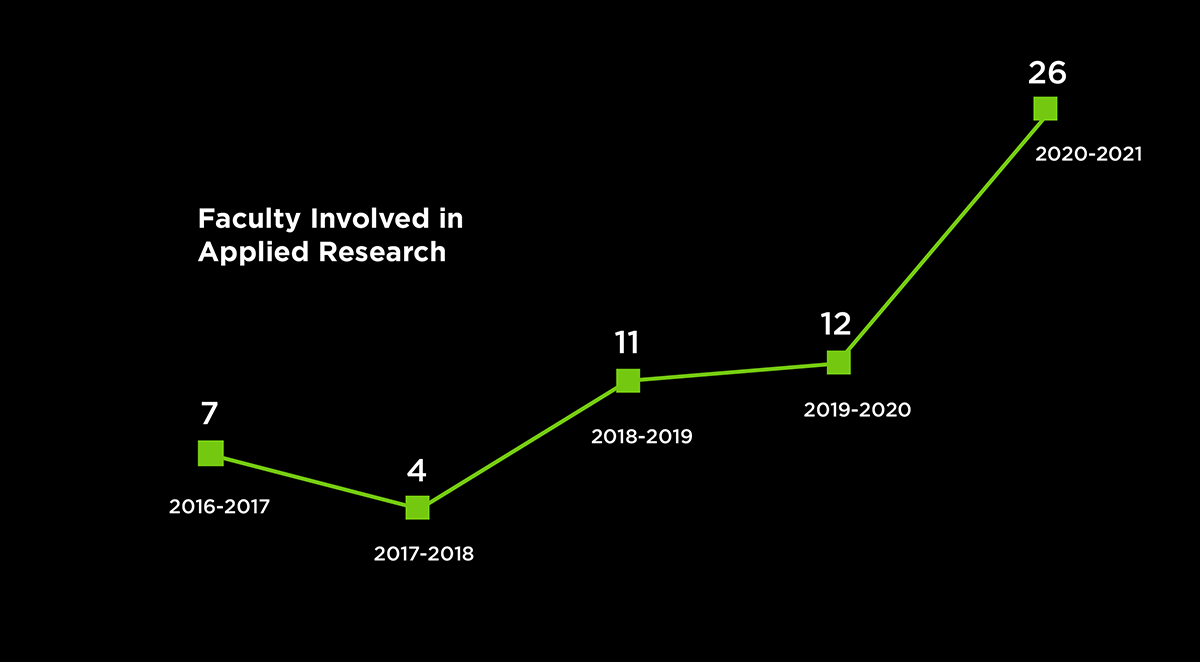
In 2019 Fleming made a commitment to expand applied research activities across the College and make a greater contribution to innovation. One year later, in the 2020 Canada’s Top 50 Research Colleges List published by Research Infosource Inc., Fleming achieved its highest ranking ever, placing 23rd overall amongst all colleges in Canada in research income.
While research income is a decent metric by which to measure applied research success, the true value that Fleming’s applied research brings to its communities is inestimable. With a new mandate to expand applied research activity in 2019, Fleming’s Office of Applied Research and Innovation (OARI) has been working hard to support the expansion of research activities into several new areas, forging new partnerships, and supporting faculty and student contributions to innovation.
The Centre for Water &
Wastewater Technologies
Traditionally, the majority of the applied research at Fleming has occurred at its primary research facility, the Centre for Advancement in Water and Wastewater Technologies (CAWT) at the Frost Campus in Lindsay.
The CAWT is a renowned, accredited research centre that has been providing applied research and technology development services to the private sector, to government and non-governmental agencies, and to universities, for over 15 years. In 2020-2021 the CAWT worked on 38 projects with over 40 partner companies and 15 public sector and non-profit groups. Often working at full capacity, in 2020 the CAWT built not one, but two additional research facilities to house research equipment and projects. Funded in part by the Canada Foundation for Innovation (CFI) and the Ontario Research Fund (ORF), the CAWT’s recently completed additional on-campus research facility has more equipment and lab space to allow CAWT scientists, faculty researchers, engineers, technologists and students to continue their innovative work. For instance, this year the CAWT secured $75,000 in funding from the Natural Sciences and Engineering Research Council of Canada (NSERC) to help a small Canadian company with their development of an intelligent wastewater sensing solution to predict COVID-19 outbreaks when monitoring wastewater. The CAWT’s new off- campus research facility in Minden is the only one of its kind in Ontario. There the CAWT’s expert research team is helping companies develop, test and certify their advanced onsite wastewater technologies for Canada’s northern climate.
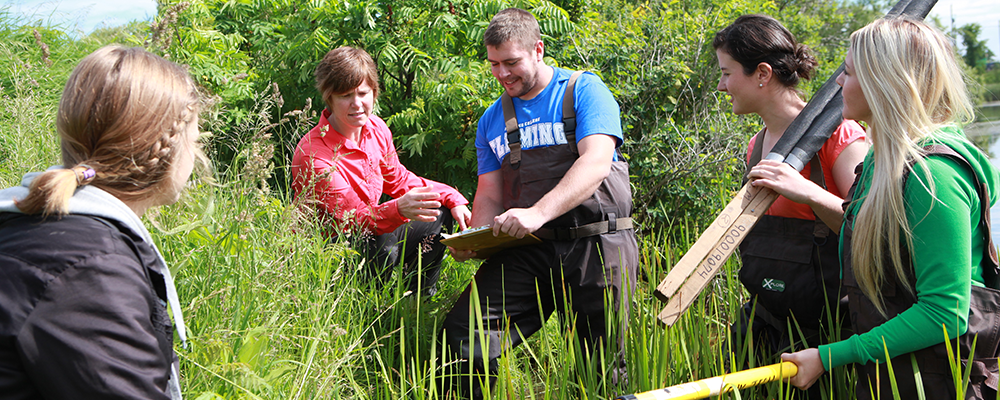
The Centre for Innovative Aquaculture &
the Centre for Advancement in Mechatronics
& Industrial Internet of Things
Building on recent success in applied research related to both the Aquaculture and Mechatronics academic programs, and thanks to nearly $9M in funding from NSERC, CFI, and ORF, in 2020 Fleming established two new applied research centres:
- the Centre for Innovative Aquaculture Production (CIAP) and
- the Centre for Advancement in Mechatronics and Industrial Internet of Things (CAMIIT)
The CIAP, located at the Frost campus in Lindsay, will be a unique custom-designed, land- based aquaculture research facility. The labs and research hatchery will enable the completion of research projects exploring innovative techniques, technologies, and approaches to growing and producing fish for food consumption. Responding to the research needs of the local and regional aquaculture industry, CIAP researchers are already working with industry partners on applied research projects related to rainbow trout, arctic char, and fish-rearing environments.
The CAMIIT research labs, located at the Sutherland Campus in Peterborough, feature the state-of-the-art equipment needed to complete research in the field of mechatronics, wireless communications, and the Industrial Internet of Things. CAMIIT’s expert researchers are already working with innovative Canadian companies such as the award-winning communications tech company BehrTech and local high-tech aerospace company, Horizon Aircraft. For Horizon Aircraft, Fleming is helping the Lindsay-based company solve design and production challenges related to complex parts for an innovative made-in-Canada aircraft.
As evidenced by the ongoing success of the CAWT and the industry support leading to the creation of the CIAP and CAMIIT, Fleming has excelled at environmental and technology-based innovation. As the College pushes to expand its applied research into new areas, faculty are taking up the charge and proving that Fleming can also excel at social innovation.
School of Justice &
Community Development
Building on recent success in applied research related to both the Aquaculture and Mechatronics academic programs, and thanks to nearly $9M in funding from NSERC, CFI, and ORF, in 2020 Fleming established two new applied research centres:
- the Centre for Innovative Aquaculture Production (CIAP) and
- the Centre for Advancement in Mechatronics and Industrial Internet of Things (CAMIIT)
The CIAP, located at the Frost campus in Lindsay, will be a unique custom-designed, land- based aquaculture research facility. The labs and research hatchery will enable the completion of research projects exploring innovative techniques, technologies, and approaches to growing and producing fish for food consumption. Responding to the research needs of the local and regional aquaculture industry, CIAP researchers are already working with industry partners on applied research projects related to rainbow trout, arctic char, and fish-rearing environments.
The CAMIIT research labs, located at the Sutherland Campus in Peterborough, feature the state-of-the-art equipment needed to complete research in the field of mechatronics, wireless communications, and the Industrial Internet of Things. CAMIIT’s expert researchers are already working with innovative Canadian companies such as the award-winning communications tech company BehrTech and local high-tech aerospace company, Horizon Aircraft. For Horizon Aircraft, Fleming is helping the Lindsay-based company solve design and production challenges related to complex parts for an innovative made-in-Canada aircraft.
As evidenced by the ongoing success of the CAWT and the industry support leading to the creation of the CIAP and CAMIIT, Fleming has excelled at environmental and technology-based innovation. As the College pushes to expand its applied research into new areas, faculty are taking up the charge and proving that Fleming can also excel at social innovation.
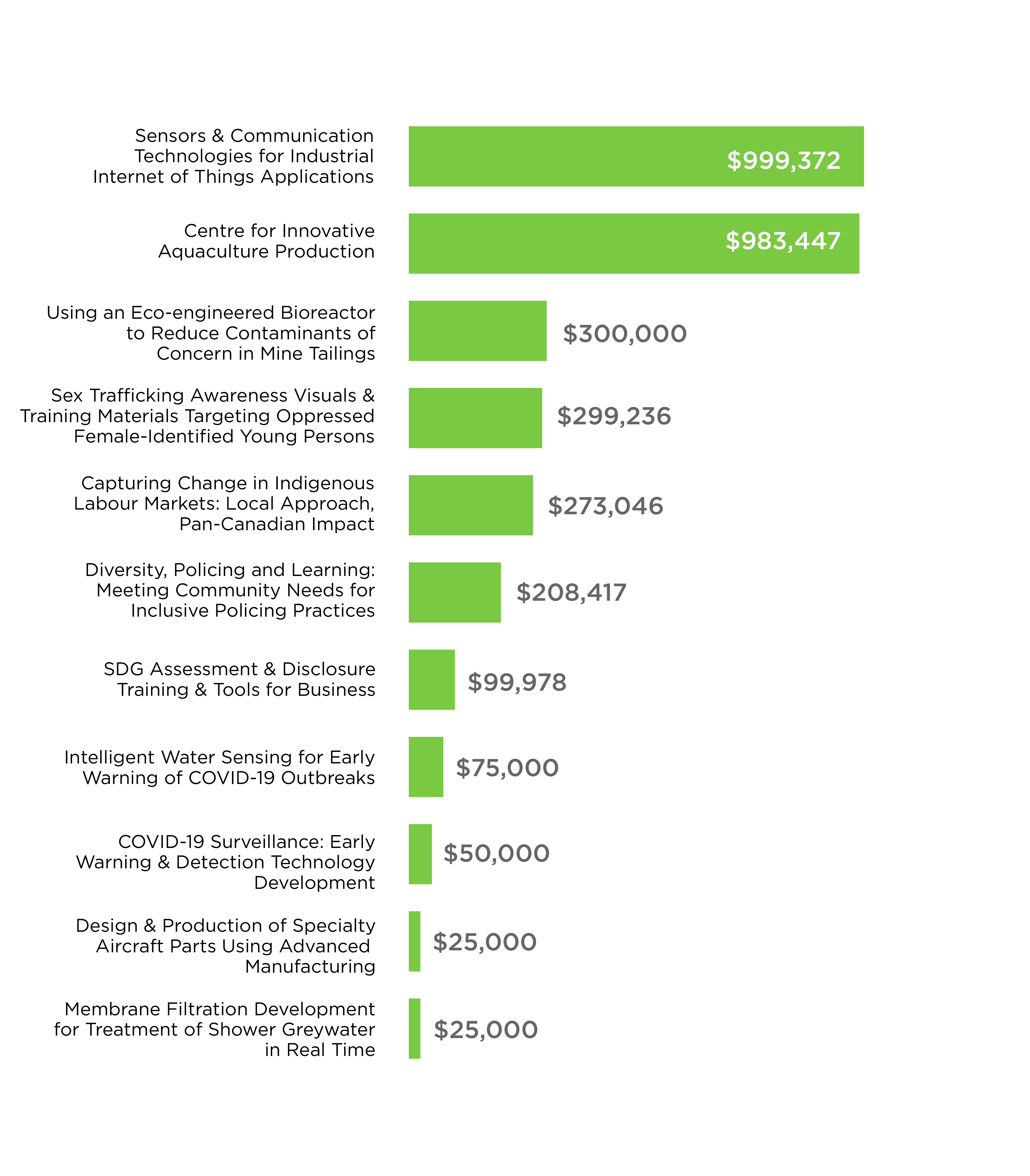
In Conclusion
Among the faculty, staff, and students of Fleming there is a strong desire to contribute to solutions for societal change and to the advancement of knowledge and understanding about individuals, groups and societies. Despite the COVID-19 pandemic and the challenges it brought to operations, in the 2020 to 2021 year the College applied to more social and community innovation research funding opportunities than it had in its history. In February 2021, for example, OARI submitted the maximum number of proposals allowed (five per institution) to the NSERC College and Community Social Innovation Fund call for proposals. The most the College had previously submitted to a call for proposals was two. For this round, the five proposed faculty-led projects ranged in subject areas that include nursing in remote areas, developing a project-based learning collaborative community model, and assisting new Canadians with gaining financial literacy skills through computer simulations.
The future is bright for applied research at Fleming. The CAWT, CIAP and CAMIIT research centres are building their capacity to engage in first-class environmental and technological applied research. At the same time, faculty and students are galvanized and motivated to make a strong contribution to social and community innovation. As conditions begin to return to normal and COVID-related restrictions ease, you can expect to see much more applied research success from Fleming.
